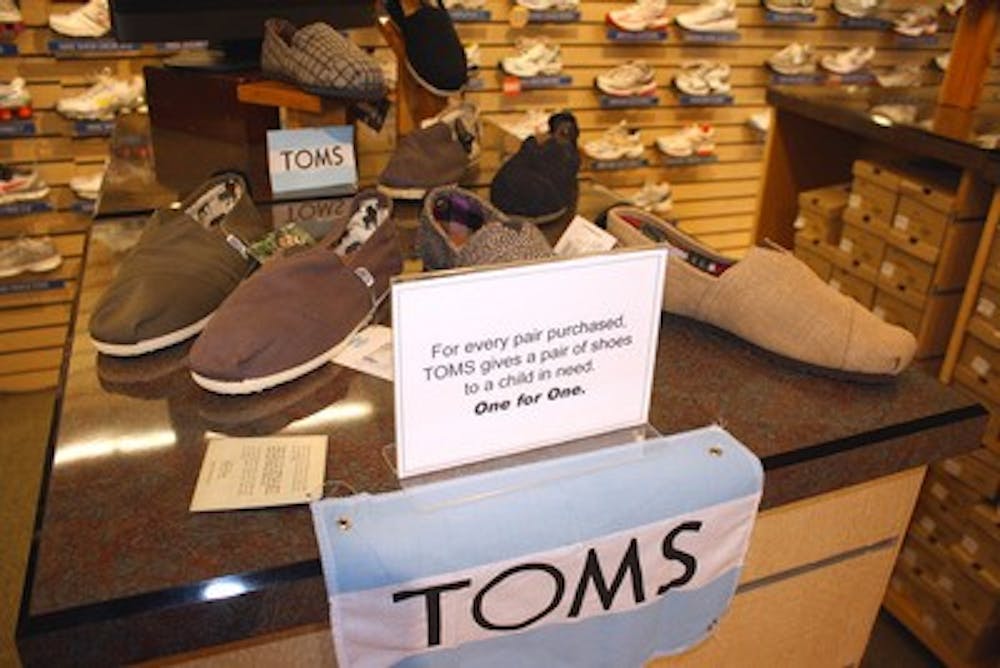With just the purchase of a pair of shoes or a bag of groceries students can help put these items in the hands of underprivileged children without leaving their local stores.
This has been a conundrum for students to consider: to give or not to give?
Usually students tend to buy things for themselves, like video games, music and numberless cups of coffee. In the college bubble, most students are dressed, fed and overall happy, so why not spend a little money on themselves?
Scott Fenton, a freshman in English, wears TOMS shoes.
"The shoes themselves are really comfortable, but the fact that in buying a pair, one is giving a pair makes these shoes irresistible," Fenton said.
When another person brings to their attention that there are those in need out in the world, the debate starts over again: to give or not to give?
Recently, several big companies have looked at this problem and come up with a creative solution.
They have stepped up to the plate and offered what can be called "buy one, donate one" products and services.
The general idea is when the consumer purchases a product, financial or material aid of equal value to the money spent is given to those in need.
The most poignant example is TOMS shoes. "One for one" is the motto of the famous footwear company that pledges to give a free pair of shoes to a needy child for every pair bought by someone else.
According to tomsshoes.com, their goal is to use the purchasing power of individuals to benefit the greater good.
Lauren O'Kelley, a sophomore in marketing, doesn't own a pair of TOMS, but plans on supporting the company.
"I would buy a pair of TOMS," O'Kelley said. "When a lot of Americans take what we have for granted, I'd feel better knowing that, in giving a pair to a needy kid, he was benefiting from my purchase."
Another company based on this principle is Snapfinger. By starting the "Takeout Hunger Day" program, the company promises that with every meal ordered through snapfinger.com, meals will be donated to starving children around the world.
The Web site asks readers to order at least one meal through Snapfinger every Wednesday to help feed nearly a million kids.
Jim Garret, CEO of Snapfinger's parent company, Kudzu Interactive Inc. explained the current hunger situation.
"There are more than 16 million children worldwide that die each year due to starvation," Garrett said. "It is estimated that 13 million children in the US live in poverty and of that at least 20% are malnourished."
Garret explained there are four billion take out transactions each year in the U.S.
"If we could get just 20 percent of those transcations to go through snapfinger.com, we could eliminate childhood hunger," Garret said.
The concept of "buy one, donate one" is not entirely new.
The Product (RED) foundation established a similar movement by joining with big name companies to gather funds for AIDs research in Africa.
For instance, GAP clothing stores offer a whole (RED) line of clothing made to benefit those affected by the disease.
Starbucks has also gotten on board by pledging that when Product (RED) items are purchased, a majority of the funds will go to help coffee farmers in Africa.
Even Microsoft has a Product (RED) version of Windows Vista Ultimate available, according to www.joinred.com.
During these hard economic times, when job holders are making just enough to take care of themselves and their families, the "to give or not to give" debate has become even more sad. Those who used to be the givers have quickly turned into those who need help, and donations to service organizations are hard to come by.
By taking advantage of "buy one, donate one" companies, one could see where the answer to the dilemma can be found.
"I do think we can bring these [issues] to people's attention and little by little we can make a difference," Garret said.
So take the time to think about that cup of coffee, that pair of shoes or the entire menu at a restaurant. Consider who put in the effort for those things to be produced and consider how their whole livelihood may depend on it..
Just by taking a small amount of time to re-think ways of doing normal activities, people can make a difference.
So drink the coffee, wear the shoes and eat a meal, there is someone else out there who could be receiving the same necessary items and thriving because of the generosity of others.
Do you like this story? The Plainsman doesn't accept money from tuition or student fees, and we don't charge a subscription fee. But you can donate to support The Plainsman.




